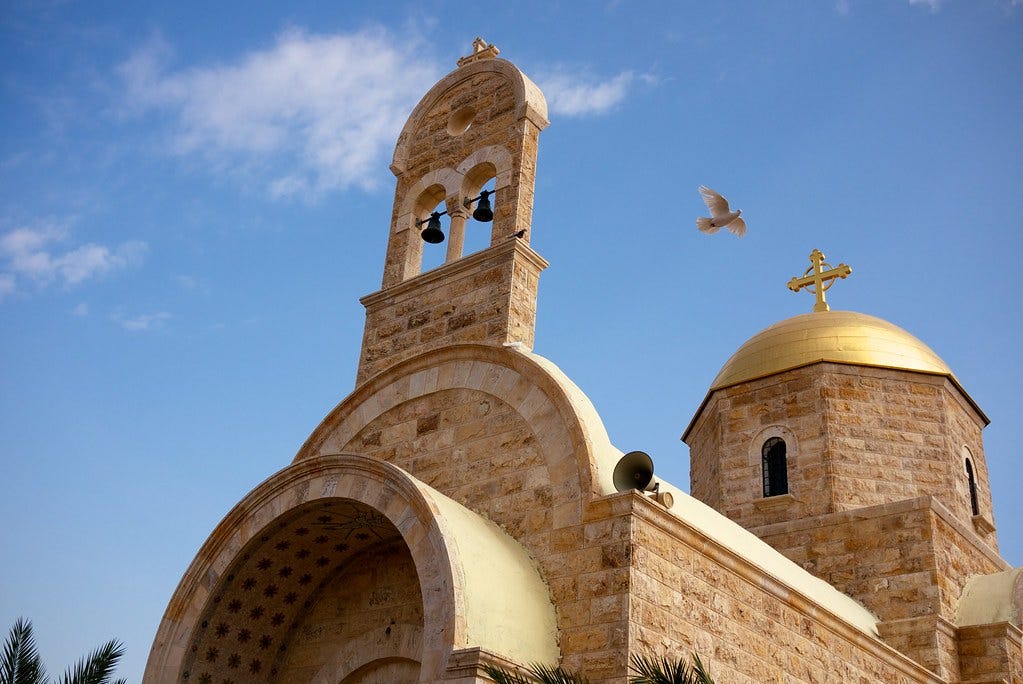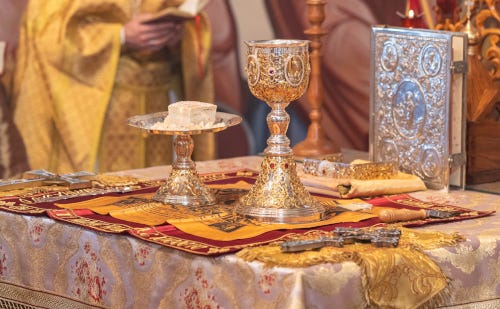"There is nothing better than peace in Christ, for it brings victory over all the evil spirits on earth and in the air. When peace dwells in a man's heart it enables him to contemplate the grace of the Holy Spirit from within. He who dwells in peace collects spiritual gifts as it were with a scoop, and he sheds the light of knowledge on others. All our thoughts, all our desires, all our efforts, and all our actions should make us say constantly with the Church: "O Lord, give us peace!" When a man lives in peace, God reveals mysteries to him.."
- St. Seraphim of Sarov
Daily Scripture Readings
Colossians 2:20-3:3
BRETHREN, if with Christ you died to the elemental spirits of the universe, why do you live as if you still belonged to the world? Why do you submit to regulations, “Do not handle, Do not taste, Do not touch” (referring to things which all perish as they are used), according to human precepts and doctrines? These have indeed an appearance of wisdom in promoting rigor of devotion and self-abasement and severity to the body, but they are of no value in checking the indulgence of the flesh. If then you have been raised with Christ, seek the things that are above, where Christ is, seated at the right hand of God. Set your minds on things that are above, not on things that are on earth. For you have died, and your life is hid with Christ in God.
Luke 17:26-37
The Load said, “As it was in the days of Noah, so will it be in the days of the Son of man. They ate, they drank, they married, they were given in marriage, until the day when Noah entered the ark, and the flood came and destroyed them all. Likewise as it was in the days of Lot — they ate, they drank, they bought, they sold, they planted, they built, but on the day when Lot went out from Sodom fire and sulphur rained from heaven and destroyed them all — so will it be on the day when the Son of man is revealed. On that day, let him who is on the housetop, with his goods in the house, not come down to take them away; and likewise let him who is in the field not turn back. Remember Lot’s wife. Whoever seeks to gain his life will lose it, but whoever loses his life will preserve it. I tell you, in that night there will be two in one bed; one will be taken and the other left. There will be two women grinding together; one will be taken and the other left.” And they said to him, “Where, Lord?” He said to them, “Where the body is, there the eagles will be gathered together. Nevertheless, when the Son of man comes, will he find faith on earth?”
Prophet Obadiah (Abdia)
The holy Prophet Obadiah [or Abdia] is the fourth of the Twelve Minor Prophets, and he lived during the ninth century B.C. He was from the village of Betharam, near Sichem, and he served as steward of the impious Israelite King Ahab. In those days the whole of Israel had turned away from the true God and had begun to offer sacrifice to Baal, but Obadiah faithfully served the God of Abraham, Isaac and Jacob in secret.
When Ahab’s wife, the impious and dissolute Jezebel, hunted down all the prophets of the Lord (because of her quarrel with the Prophet Elias), Obadiah gave them shelter and food (3/1 Kgs 18:3 ff). Ahab’s successor King Okhoziah [Ahaziah] sent three detachments of soldiers to arrest the holy Prophet Elias (July 20). One of these detachments was headed by the holy Prophet Obadiah. Through the prayer of the Prophet Elias, two of the detachments were consumed by heavenly fire, but Obadiah and his detachment were spared by the Lord (4/2 Kgs 1).
From that moment Obadiah resigned from military service and became a follower of the Prophet Elias. Afterward, he himself received the gift of prophecy. The God-inspired work of the Prophet Obadiah is the fourth of the Books of the Twelve Minor Prophets in the Bible, and contains predictions about the future salvation of the Gentiles (Vs. 15) and that the Savior would come forth from Sion (Vs. 17). The holy Prophet Obadiah, whose name means servant (or worshipper) of the Lord, was buried in Samaria.
In iconography, the Prophet Obadiah is depicted as a grey-haired old man with a rounded beard. His scroll reads: “In that day, saith the Lord, I shall destroy the wise men out of Idumea.”(Obadiah 8).
The fear of God
Metropolitan of Pisidia Sotirios
In the petition which we address to God, “For this Holy House” (which we heard about in the previous Homily), the following words are also said: “and for those who enter it with faith, reverence, and fear of God, let us pray to the Lord.” In other words, to pray for those who enter the holy Church with faith, reverence and fear of God.
What does the Church mean by “fear,” which is connected with the faith and reverence of Christians who are entering the church? We can definitely say that the “fear of God” has no relation whatsoever with the fear that someone feels when an enraged person attacks them with a weapon (or any other visible danger associated with the word “fear”). It is impossible for God to be the cause of this kind of fear, as He is compassionate, merciful, and full of love.
To understand what the “fear of God” really is, let us look at the Holy Bible (both the Old and New Testaments).
The first and foremost Commandment of God on Mount Sinai was “You shall fear the Lord your God and Him alone you shall worship” (Deuteronomy 6:13). When Moses later spoke to the people of Israel, he said to them (among other things): “You should feel an awe (profound reverence) and love towards God, the Almighty, Who, as you have seen with your own eyes, performed great and wonderful deeds. You should walk in all His ways and worship Him with all your heart and with all your soul. Be careful to worship Him alone and hold fast to Him” (see Deuteronomy 10:12, 20-21). St. Paul the Apostle also emphasized this: “Let us serve God acceptably with reverence and godly fear” (Hebrews 12:28). The Prophet Jeremiah (32:40) explains that the fear of the Lord is a gift of God, offering His words: “I will put My fear (= a deep reverence-godliness) into their hearts so they may not depart from Me.”
This fear is granted as a gift to the person who turns to God through faith. It is a type of enlightenment, and a reflection of faith. It is the result of Divine Grace. A person who has this fear of God in their heart stands in reverence before God’s greatness, and realizes their own spiritual poverty. It is this profound respect and awe (the fear of God) that motivates the soul to devote one’s whole being to God, the Creator of All. As St. Sophrony of Essex reassures us: “The fear of God is dazzling to us in front of God Who is revealing Himself. We feel unworthy of such a God and we are in a state of awe.”
This is why there are many references in the Divine Liturgy and Services to the fear of God:
“Make us worthy, Oh Lord, of loving and feeling fear for You, from the bottom of our heart” (Third Prayer of Vespers).
“Implant in us also the fear of Your blessed commandments” (Prayer before the Gospel reading).
“Grant also, Oh God, to those who pray with us … to serve Thee with fear and love … (Second Prayer of the Faithful).
“With the fear of God, and faith, and love, draw near” (Before Holy Communion).
“ … establish us all in Thy fear;” (After Holy Communion).
My beloved brothers and sisters, the Church prays for those who come with faith, reverence and the fear of God. At the same time, we are reminded of how we should feel in our hearts when we enter the church and worship God. The church is not an ordinary place, but a place wholly devoted to God. The Precious Body and Blood of Christ are kept on the Holy Table (Altar), and so the Lord our God is always present. He is inviting and welcoming us to His holy Home, in His house. This thought must always be first in our minds while we are in the sacred church. Our hearts and souls should be concentrated on Christ. We should have the sense of awe that Moses felt in front of the burning bush, when he heard God’s voice saying to him: “the place where you stand is holy ground” (Exodus 3:5). After that, Moses did not dare lift his eyes, “… for he was afraid to look at God” (Exodus 3:6). While in the church, our behavior should completely reflect this. We must not chat with one another or be noisy. We are to venerate the holy icons and express reverence to the persons depicted on them. We should light our candles with devotion. So long as we are inside the church, we try to keep our minds and hearts on what is happening during the Divine Liturgy, or any other Service (not letting our thoughts wander). If we are guests of the Supreme Ruler of the State in their Palace, is it possible to turn around and start chatting with each other while they are there in front of us? If such a thing is unacceptable, it is even more so when taking place inside the church of God.
In the Cherubic hymn, we hear that in the course of the Divine Liturgy “we are mystically representing the Cherubim.” How are the Angels standing in front of God’s Throne? The Prophet Isaiah (6:2-3) reveals to us that they are covering their faces, out of reverence for God. If the Angels act in this way, then how much greater must our humility be, when standing inside God’s temple!
May the Lord grant to us all His divine fear, and make us worthy of worshipping Him always with a burning faith, holy reverence, and warm love, so that our worship may be well received by Him. Amen.
This week’s calendar reminders:
Monday 11/18: Matins 8:30 a.m.
Tuesday 11/19: no services or events
Wednesday 11/20: Vesperal Liturgy 6:30 p.m.
Thursday 11/21: Festal Matins 8:30 a.m.;
Friday 11/22: Paraklesis to Theotokos 8:30 a.m.
Saturday 11/23: Catechumen class 4:30; Great Vespers 6pm
Sunday 11/24: Divine Liturgy 9: 15 a.m.











